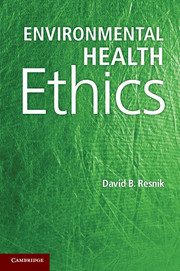Book contents
- Frontmatter
- Contents
- Figures and Tables
- Acknowledgments
- Abbreviations
- 1 Introduction
- 2 An Overview of Environmental Health
- 3 Ethical Theory
- 4 Toward an Environmental Health Ethics
- 5 Pest Control
- 6 Genetic Engineering, Food, and Nutrition
- 7 Pollution and Waste
- 8 The Built Environment
- 9 Climate Change, Energy, and Population
- 10 Justice and Environmental Health
- 11 Environmental health Research Involving Human Participants
- 12 Conclusion
- References
- Index
5 - Pest Control
Published online by Cambridge University Press: 05 July 2012
- Frontmatter
- Contents
- Figures and Tables
- Acknowledgments
- Abbreviations
- 1 Introduction
- 2 An Overview of Environmental Health
- 3 Ethical Theory
- 4 Toward an Environmental Health Ethics
- 5 Pest Control
- 6 Genetic Engineering, Food, and Nutrition
- 7 Pollution and Waste
- 8 The Built Environment
- 9 Climate Change, Energy, and Population
- 10 Justice and Environmental Health
- 11 Environmental health Research Involving Human Participants
- 12 Conclusion
- References
- Index
Summary
Having explored the foundations of environmental health ethics in Chapters 2 through 4, I will examine some particular topics and controversies in Chapters 5 through 11, making use of the method for ethical decision making described in the previous chapter. This chapter will focus on the use of chemicals and other substances to control pests. I will give an overview of some of the salient facts before addressing ethical and policy issues. Other chapters will follow a similar pattern.
PESTICIDES
As noted in Chapter 2, a pesticide is a substance used to control, repel, or kill pest species. The term “pest” is anthropocentric: A species is considered to be a pest if it threatens human health and well-being (Robson et al. 2010). There are a variety of ways that pests harm human beings or human interests (Robson et al. 2010):
Bacteria, fungi, and protozoa cause human, animal, and plant diseases.
Mosquitoes, lice, flies, ticks, fleas, and pigeons serve as vectors for disease.
Worms and flies infect humans and animals.
Cockroaches can trigger allergies, exacerbate asthma, and contaminate food.
Ants contaminate food, damage wood structures, and harm crops.
Termites damage wood structures.
Rats and mice serve as vectors for disease and contaminate food.
Aphids, locusts, corn borers, Japanese beetles, Mediterranean fruits flies, corn earworms, and many other insects damage crops.
Many different weeds interfere with the germination, growth and fruition of crops, and some, such as poison ivy, are harmful to humans.
Coyotes, wolves, foxes, and snakes kill livestock and farm animals.
Some species of spiders, insects, and venomous snakes have poisonous bites or stings that can cause pain, disability, or death.
- Type
- Chapter
- Information
- Environmental Health Ethics , pp. 80 - 102Publisher: Cambridge University PressPrint publication year: 2012



